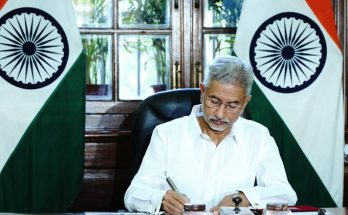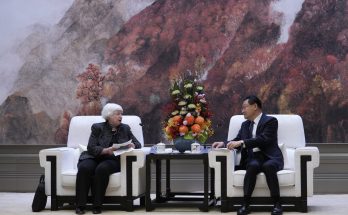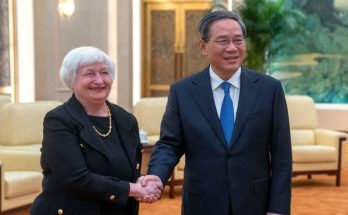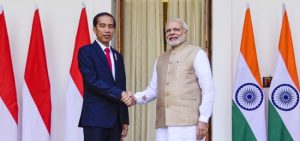 With an eye on China, India and Indonesia, Asia’s most populous democracies and emerging powers, have firmed up a blueprint for enhancing maritime cooperation and resolved to jointly combat terror. In a calculated move that is set to antagonise Beijing, India has backed Indonesia on the latter’s escalating dispute with China on territorial claims in South China Sea.
With an eye on China, India and Indonesia, Asia’s most populous democracies and emerging powers, have firmed up a blueprint for enhancing maritime cooperation and resolved to jointly combat terror. In a calculated move that is set to antagonise Beijing, India has backed Indonesia on the latter’s escalating dispute with China on territorial claims in South China Sea.
The talks between Prime Minister Narendra Modi and Indonesia’s President Joko Widodo in New Delhi on December 12 have culminated in an ambitious joint statement to upscale strategic partnership, with concrete plans for expanding bilateral defence and maritime cooperation. The first visit by Jokowi, as the Indonesian president is popularly known in his country, to India has been closely watched in China, which looks at India’s attempts to forge closer strategic ties with ASEAN countries as part of its calibrated containment strategy.
Managing China Challenge
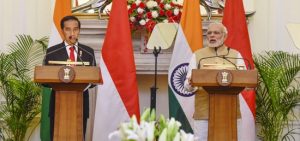 India and Indonesia, fellow-travellers in the Non-Aligned Movement and now dynamic emerging economies, are striving to modernise their relationship in the context of the new geo-strategic realities and flux in the region. China was the elephant in the room when PM Modi and his Indonesian counterpart held talks in the Indian capital as both India and Indonesia count China as their largest trading partner, but have unease about Beijing’s hegemonistic intentions. Managing the China challenge without getting into the containment trap is a shared concern for both countries.
India and Indonesia, fellow-travellers in the Non-Aligned Movement and now dynamic emerging economies, are striving to modernise their relationship in the context of the new geo-strategic realities and flux in the region. China was the elephant in the room when PM Modi and his Indonesian counterpart held talks in the Indian capital as both India and Indonesia count China as their largest trading partner, but have unease about Beijing’s hegemonistic intentions. Managing the China challenge without getting into the containment trap is a shared concern for both countries.
The relations between India and Indonesia, despite having shared concerns and interests, remain underleveraged for a host of reasons. That’s why Mr Widodo’s maiden visit to India was significant as it addresses the diplomacy deficit and could lead to a return visit by Mr Modi to Jakarta soon. In his joint media interaction in Delhi, Mr Modi placed the India-Indonesia relations in the larger context of emerging realties of the 21st century. “Indonesia is one of India’s most valued partners in our Act East Policy. It is the largest economy in South East Asia. And, India is one of the fastest growing large economies in the world. As two large democracies and major emerging economies, we have shared economic and strategic interests. We also face common concerns and challenges. My extensive conversation with President today focused on the full range of our cooperation,” said the Indian leader.
Maritime Concord
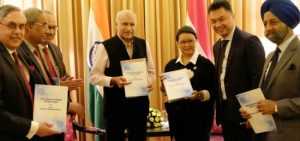 The talks rightly prioritised expanding defence and security cooperation as a core priority to actualise the full potential of this sub-optimal relationship. “As two important maritime nations that are also neighbours, we agreed to cooperate to ensure the safety and security of the sea lanes, in disaster response and environmental protection,” said Mr Modi.
The talks rightly prioritised expanding defence and security cooperation as a core priority to actualise the full potential of this sub-optimal relationship. “As two important maritime nations that are also neighbours, we agreed to cooperate to ensure the safety and security of the sea lanes, in disaster response and environmental protection,” said Mr Modi.
In the backdrop of China’s rejection of the Hague tribunal’s verdict on the South China Sea, the concord between New Delhi and Jakarta on the primacy of the United Nations Convention on the Law of the Sea (UNCLOS) was significant as the two democracies exhorted Beijing (without specifically naming it) to abide by a rules-based international order, specially in the maritime domain. “…they urged all parties to resolve disputes through peaceful means, without resorting to threat or use of force and exercise self-restraint in the conduct of activities, and avoid unilateral actions that raise tensions,” said the joint statement issued at the end of the talks between the leaders of India and Indonesia.
“Both Leaders agreed to conclude a Memorandum of Understanding on Maritime Cooperation between Indonesia and India in order to further strengthen and accelerate maritime cooperation inter alia in maritime safety and security, and promotion of maritime industries, as one of the important pillars towards enhancing the bilateral relationship,” said a separate statement by India and Indonesia on maritime cooperation.
Uniting against Terrorism
Another important takeaway from the latest round of high-profile engagement between the leaders of India and Indonesia was a convergence of positions on terrorism that thrives on sanctuaries provided by states with vested interests. While China has been dithering on India’s appeal to support the designation of Masood Azhar, the prime suspect in the Pathankot and Uri terror attacks, as an international terrorist, Indonesia, the world’s most populous Muslim nation, supported implementation of the United Nations Security Council Resolution 1267, which seeks to ban militant groups and their leaders, and other resolutions designating terrorist entities. Jakarta’s support for New Delhi underscores growing regional exasperation with the segmented approach to terrorism, with the India-Indonesia joint statement making it clear that here must be “zero tolerance” of acts of terror. “Both leaders discussed the threat from global terrorism and other transnational crimes and resolved to significantly enhance bilateral cooperation in combating terrorism, terror-financing, money-laundering, arms-smuggling, trafficking in human beings and cybercrime,” said the joint statement. In a veiled reference to Pakistan, the statement also exhorted all nations to work towards eliminating terrorist safe havens and infrastructure, disrupting terror networks and their financing channels and stopping cross-border terrorism.
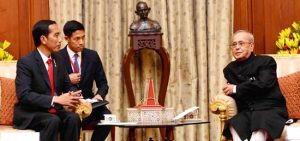 This strategic concord between Asia’s emerging economies on issues of terrorism and South China Sea is a signal to China that there is not much room for ambivalence and sent a message to the region that the entire Asian hemisphere benefits from a collective approach to regional security.
This strategic concord between Asia’s emerging economies on issues of terrorism and South China Sea is a signal to China that there is not much room for ambivalence and sent a message to the region that the entire Asian hemisphere benefits from a collective approach to regional security.
Building upon this congruence in the strategic and security areas, India and Indonesia also decided to inject more substance into their growing economic partnership as the two countries decided to boost their economic engagement in the areas of oil and gas, renewable energy, information technology and pharmaceuticals. The launch of a direct flight between Jakarta and Mumbai and the signing of a pact on cooperation in youth affairs and sports and standardisation underlines that the two countries are finally getting serious about broad-basing their strategic partnership by positioning people at the heart of this crucial relationship.
Author Profile

- Manish Chand is Founder-CEO and Editor-in-Chief of India Writes Network (www.indiawrites.org) and India and World, a pioneering magazine focused on international affairs. He is CEO/Director of TGII Media Private Limited, an India-based media, publishing, research and consultancy company.
Latest entries
 India and the WorldJuly 9, 2024Defying West, India sets $100 billion trade target with Russia
India and the WorldJuly 9, 2024Defying West, India sets $100 billion trade target with Russia India and the WorldJuly 5, 2024India at SCO: Takes swipe at Pakistan for cross-border terror, pushes alternative to BRI
India and the WorldJuly 5, 2024India at SCO: Takes swipe at Pakistan for cross-border terror, pushes alternative to BRI India and the WorldJune 14, 2024Modi’s Day 1 in Italy: Bonding with Britain, France
India and the WorldJune 14, 2024Modi’s Day 1 in Italy: Bonding with Britain, France India and the WorldJune 13, 2024G7 summit in Italy: Modi to showcase India as leader of Global South
India and the WorldJune 13, 2024G7 summit in Italy: Modi to showcase India as leader of Global South




